I will tell you about everything from the birth of Shoaib Akhtar to the beginning of his career and during cricket.
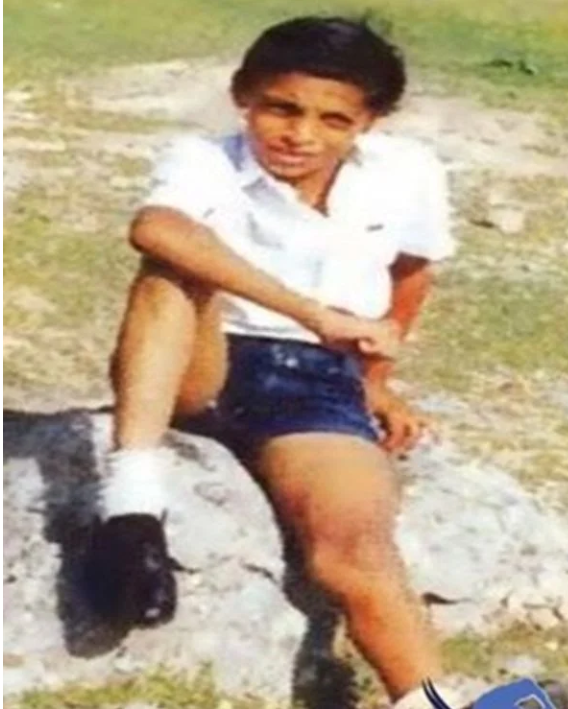
Shoaib Akhtar born 13 August 1975) is a Pakistani former cricketer and commentator who is regarded as the fastest bowler in history of international cricket, having bowled a delivery at 161.3 km/h (100.23 mph), in an ODI against England – a pool match during the 2003 Cricket World Cup. He was nicknamed "Rawalpindi Express", in reference to his speed and hometown, and "Tiger۔He was also the first bowler to be recorded bowling at 100 miles per hour, and did so twice in his career.
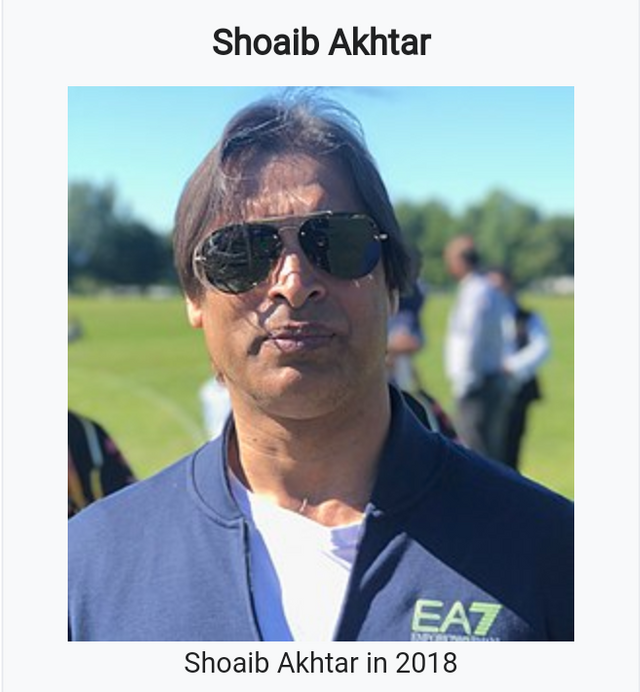
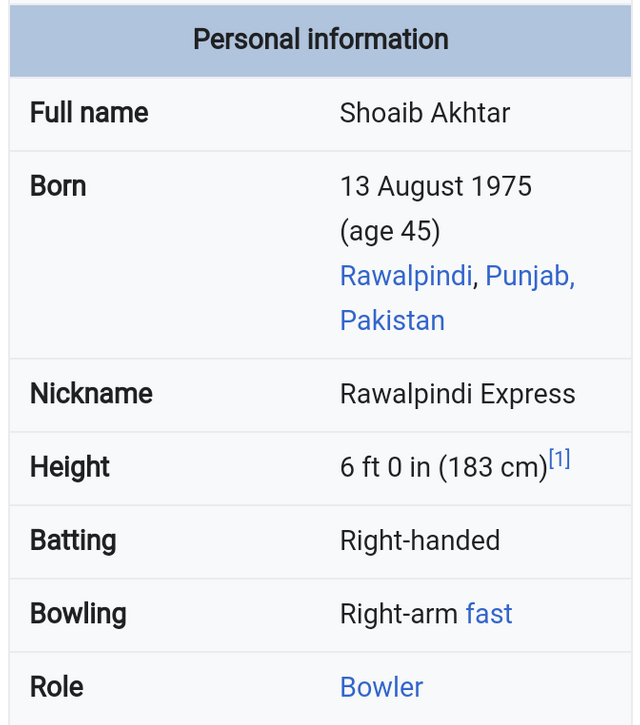
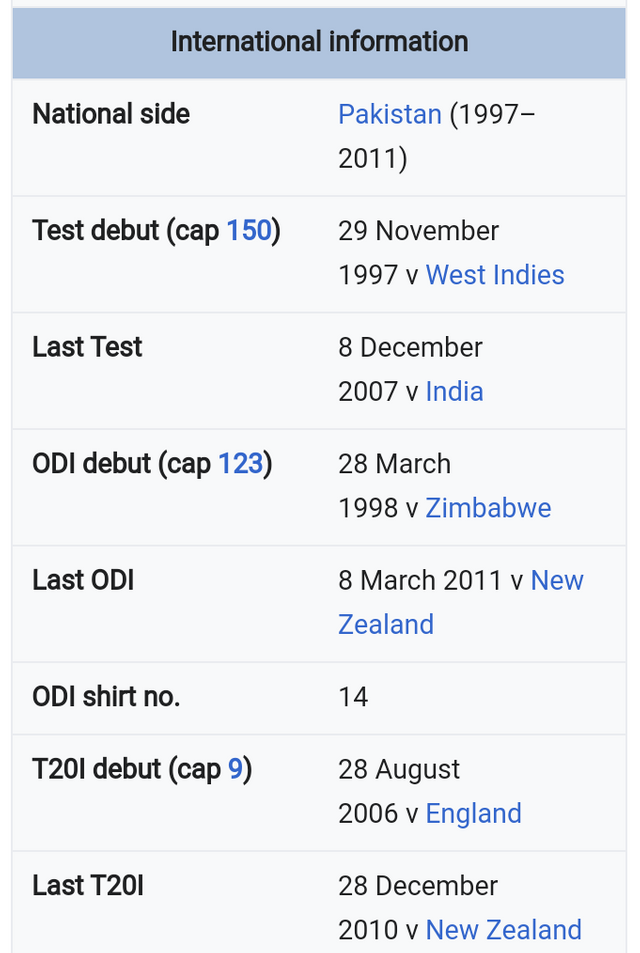
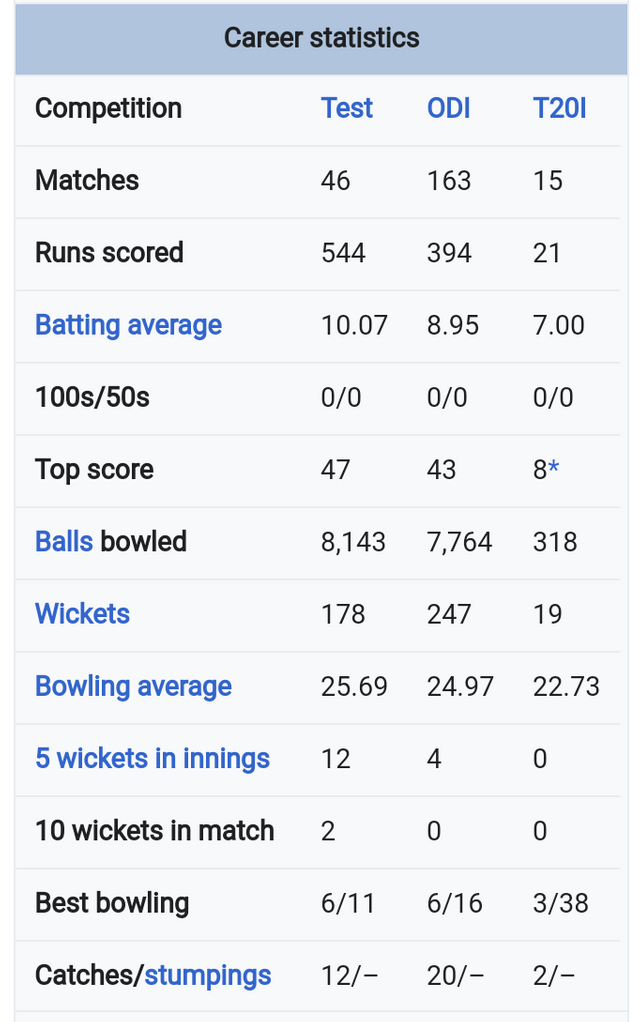
He made his Test debut in November 1997 as an opening fast bowler and played his first One Day International three months later.[citation needed]
Akhtar has been involved in several controversies during his career, often accused of unsportsmanlike conduct, despite his commendations for significantly impacting games in Pakistan's favour. Akhtar was sent home during a Test match series in Australia in 2005 for alleged poor attitude. A year later, he was embroiled in a drug scandal after testing positive for the performance-enhancing substance nandrolone. However, the ban imposed on him was lifted on appeal.[citation needed]
In September 2007, he received a ban.[5] On 1 April 2008, Akhtar was banned for five years for publicly criticising the Pakistan Cricket Board.[6] In October 2008, the Lahore High Court in Pakistan suspended the five-year ban and Akhtar was selected in the 15-man squad for the Twenty20 Quadrangular Tournament in Canada.[7] Pakistani judge Rana Bhagwandas once stated that Akhtar is a legend of Pakistan cricket.[8] Akhtar retired from international cricket after the 2011 World Cup.
Personal life.
Akhtar was born in mohalla Jaadi, a place he calls a “dilapidated neighbourhood”, in the small town of Morgah in Rawalpindi, Punjab, Pakistan. His father, Mohammad Akhtar, whom Shoaib describes as very religious and “from a hardworking, economically unprivileged family of the Gujjar community”, worked as a night watchman at a petrol station belonging to the Attock oil refinery, and married his mother, Hameeda Awan, when she was still a teenager, and they had five children: four sons, Shoaib being the fourth after Shahid, Tahir and Obaid, followed by a daughter, Shumaila. Shoaib’s name, which in Arabic means both “the one who brings people together” and “the one who separates”, was chosen by his mother.[9]
He married Rubab Khan on 11 November 2014.
Beginnings.
A good student, Akhtar was admitted to the Asghar Mall College, but disrupted his studies to attend trials for the PIA team's Karachi division to be held in Lahore. Lacking the money for a bus ticket, he waited for the bus to start and got onto the roof.[12] After some struggle, starting his List A career during the 1993/1994 season and his first-class career during the 1994/1995 one, he caught the eye of Majid Khan, then the chief executive of the PCB, and after a good performance for the Pakistan A team's tour of England, in 1996, he was rewarded his maiden Test cap against the West Indies, in 1997.
International career.
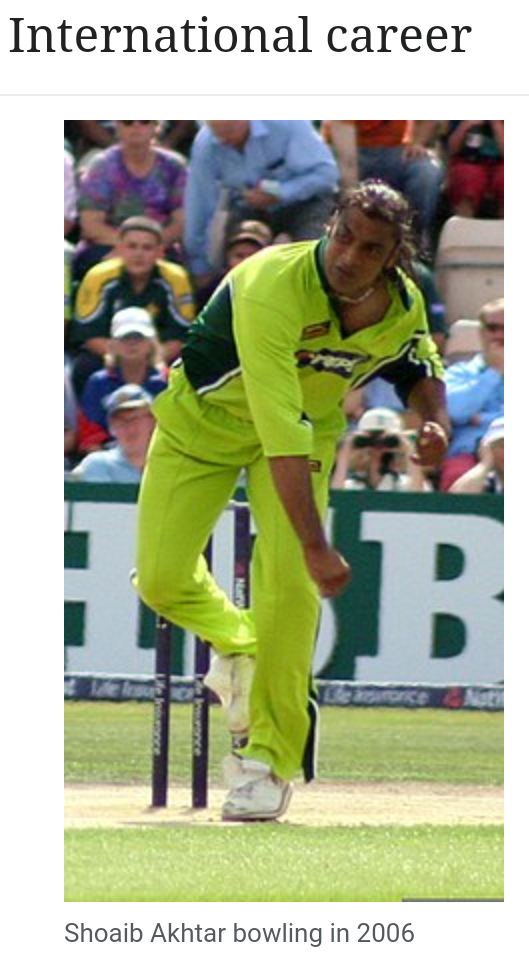
Considering his subsequent high profile in cricket, Akhtar's test career started rather modestly. He was first picked to play on his home ground in Rawalpindi during the 2nd Test of the West Indies 1997/98 tour of Pakistan. He was subsequently included in the tour of South Africa during the winter of 1998, where he played in all three Tests. He was notably the spearhead of a depleted Pakistani bowling attack in the Peshawar Test against the visiting Australians later in 1998, where Mark Taylor scored his famous unbeaten 334 in Australia's first innings. Subsequently, after 8 tests and 16 innings, Akhtar had accumulated only 18 wickets.
Akhtar's run of average performances started in 1999, during a pre-World Cup series against India. It was followed by high-class bowling performances in Sharjah and later in the 1999 Cricket World Cup.
In 2002, he was selected for the Pakistan team against Australia and achieved a small amount of success. However the team performed poorly during the 2003 Cricket World Cup and after the tournament he was dropped from the Pakistan squad. He was selected back into the Pakistan squad as they had no choice in the 2003 Test match series against New Zealand, but struggled in a losing Test series against India in 2004. The series ended with a controversy when he left the field citing an injury leading to suspicions by former Pakistan captain, Inzamam-ul-Haq, about his commitment to the team. As a result, his relationship with Inzamam-ul-Haq and former Pakistan coach Bob Woolmer deteriorated. A medical panel was set up by the Pakistan Cricket Board to investigate the nature of his injury, however Pakistan officials dispelled all suspicions.In 2005, Akhtar regained his reputation as a fast bowler for his side. Playing in a three Test home series against England, he made a series of impressive bowling performances. His effective use of slower deliveries proved to be unplayable by the English batsmen. Akhtar emerged as the highest wicket taker of the series with seventeen wickets. His comeback was also remarkable as prior to his return, he had been criticised from all corners; such as by the Worcestershire chairman John Elliot for his celebrity attitude and lack of commitment to the team. His performance was also acknowledged by the English captain Michael Vaughan, who remarked "I thought he (Shoaib) was a big difference between the two teams". He is also known as one of only three bowlers to have ever broken the 100 mph barrier in cricket history, with a delivery of 100.2 mph, during a one-day international against England in World cup 2003.
Struggle for form and consistent injuries (2007–2009).
On 29 October 2007, Akhtar made his return to cricket from his 13 match ban and performed very well, he took 4 wickets for 43 runs against South Africa in the fifth and deciding One Day International series in Lahore in Pakistan. Subsequently, he was included in the 16-man Pakistan squad for the 2007 tour of India.
Rehabilitation and final years (2010–2011).
Akhtar made a return to international cricket albeit in the shorter format of the game. In May 2010, PCB named him in a list of 35 probables for the Asia Cup. On 15 June 2010, Akhtar made his return, taking 3 wickets for 28 runs in the first match of the Asia Cup against Sri Lanka. He narrowly missed out a spot in the 2010 ICC World Twenty20 in place of the injured Umar Gul.
In July 2010, he was selected for the Twenty20 series against Australia but the selectors decided not to play him in the Test squad so that he would not get injured. He was subsequently selected for the ODI and Twenty20 series against England in September 2010.
##Akhtar returned to the national side. representing the country against England in the Twenty20 International. He bowled an impressive spell and returned with figures of 2 wickets for 23 runs.He continued to bowl well in the ODI series in the absence of regular fast-bowlers, Mohammad Asif and Mohammad Amir, who were suspended by the International Cricket Council amid allegations of Spot-fixing. Despite his relatively good bowling form, Pakistani coach Waqar Younis insisted that the bowling attack must not become reliant on Akhtar, as he is 35 years of age and fitness troubles continue to affect him. Akhtar was selected for the tour of New Zealand and started his campaign off well with 3 wickets on Boxing Day in the first of two Twenty20 Internationals against New Zealand.
Akhtar was selected in Pakistan's 15-man squad to play in the 2011 World Cup hosted by Bangladesh, India, and Sri Lanka in February to March. During the tournament, he announced that he would retire from international cricket at the end of the World Cup. He was dropped from the squad after group matches and was not included in the quarter final either. In September, Akhtar released his autobiography, Controversially Yours.
Domestic career.
England county cricket.
Akhtar has played for three English county cricket clubs: Somerset in 2001, Durham in 2003 and 2004 and Worcestershire in 2005. He did achieve his moments of success, such as taking 5 wickets for 35 runs for Durham against Somerset in the National League in 2003 and claiming 6 wickets for 16 runs in the same competition for Worcestershire against Gloucestershire two years later, but he suffered from fitness problems, as well as a perception that he was less than interested in his task. This was particularly the case at Worcestershire: chairman John Elliott said "Players like that are no good to our club. In fact, Akhtar has been no good for any club he's been at. He's a superstar and just does what he wants."
Indian Premier League.
Akhtar made a successful return to cricket in his first game in the Indian Premier League, playing for the Kolkata Knight Riders against the Delhi Daredevils. Defending a low score of 133 runs, Akhtar took four top order wickets which ultimately led to the Daredevils being restricted to 110 runs. He ended with figures of 4 wickets for 11 runs from three overs, a performance which earned him the player of the match award.Akhtar denied that he had any point to prove with his performance, stating, "I just wanted to win the game." Knight Riders' captain Sourav Ganguly also acknowledged Akhtar's performance, "He came to the country with lots [of things] happening behind him...But he showed a lot of character."
He has also played for Cyclones of Chittagong in Bangladesh's NCL T20 Bangladesh.
Cricket controversies and injuries.
Akhtar's career has been plagued with injuries, controversies and accusations of poor attitude. After Pakistan's poor performance in the 2003 Cricket World Cup, he got involved in a verbal conflict with former Pakistan captain and fast bowler Waqar Younis. Later on Akhtar was sacked along with other players, including Younis. In a triangular series in 2003 held in Sri Lanka, he was caught ball tampering making him the second player in cricket to be banned on ball tampering charges. The same year he was banned for one Test match and two One Day International matches for abusing South African spin bowler Paul Adams, during a match against South Africa. In the 2004 home series with India, he struggled with wrist and back injuries, which raised questions about his commitment to the team.
He was sent back from the 2005 Australia tour with a hamstring injury amid rumours of indiscipline, lack of commitment and attitudinal complaints. He was subsequently fined by the Pakistan Cricket Board for avoiding a late night curfew. The rest of his cricketing career was riddled with ankle and knee injuries which forced him to undergo a surgery in February 2006, until finally he was banned for two years for allegedly using performance-enhancing drugs.
Drug scandal.
On 16 October 2006 Akhtar was suspended by the Pakistan Cricket Board, along with Mohammed Asif after they tested positive for a performance-enhancing substance nandrolone.They were consequently pulled out from the 2006 ICC Champions Trophy.Former Pakistan Cricket Board chairman later stated that he had always suspected Akhtar of substance abuse due to his consistent "reservations" to drug tests.Former Pakistan captain Inzamam ul-Haq had also previously complained about Akhtar's drug abuse but was not reported to the Pakistan Cricket Board. Akhtar immediately declared his innocence and he declined knowingly taking any performance-enhancing drugs. In a statement issued to the press, he claimed that he could never cheat teammates or opponents.During a hearing with the Pakistan Cricket Board Anti-Doping Committee, he along with Asif maintained taking non-steroidal dietary supplements.He, however, failed to convince the committee of his innocence. In its report submitted to the Pakistan Cricket Board, the Anti-Doping Committee recommended a two-year ban.
On 1 November 2006 the Pakistan Cricket Board handed down a two-year suspension to Akhtar and a one-year suspension to Asif, banning them from professional cricket during the period. Shoaib had subsequently been added to Pakistan Olympic Association list of doping offenders. However, on 5 December 2006 represented by his lawyer Abid Hassan Minto, Akhtar was cleared on appeal.
On 5 December 2006 Akhtar and Asif were acquitted by the tribunal appointed to review their appeals. After a clear hearing from Akhtar's lawyer Abid Hassan Minto, the three-man committee, voted two to one in favour of the acquittal. Justice Fakhruddin Ebrahim, committee head, and Haseeb Ahsan, former Test cricketer, were in favour of the acquittal. The third member, Danish Zaheer, differed. "Exceptional circumstances" were cited including discrepancies between the instantaneous offence charges of doping that were laid and the quick delivery of a very harsh verdict. The complete drug testing procedure was concluded to have been technically flawed as it did not follow standard procedures. Other established facts by the committee included that the duo were not aware of the banned drug to be present in their supplements because the Pakistan Cricket Board itself had not informed them of the dangers of contaminated supplements.
Akhtar and Asif, however, did not play in the subsequent Test match series against the West Indies because the Pakistan Cricket Board had recommended that they play domestic games first to recover form and fitness.On 1 March 2007 Akhtar and Asif were ruled out of the Pakistani squad for the 2007 Cricket World Cup by team officials, minutes before the squad was to depart for the West Indies. The team management along with the Pakistan Cricket Board said their injuries were too severe to risk taking them to the Caribbean. Since neither of the two had been declared fit they did not undergo official doping tests.
World Anti-Doping Agency ( WADA) challenged Pakistan's decision to lift bans on fast bowlers Akhtar and Asif by taking the case to the Court of Arbitration for Sport in Lausanne, Switzerland.The ICC supported the WADA appeal adding that it was committed to a dope free game. On 2 July 2007, the Court of Arbitration for Sport dropped the case, ruling it had no jurisdiction to challenge the decision made by PCB.
Other controversies.
In August 2007, Akhtar was reported to have used foul language against Pakistan Cricket Board protesting the imposing of fine of Rs. 300,000 for indiscipline during the national camp in Karachi.In the week before the inaugural World Twenty20, held in South Africa, Akhtar was rumoured to have hit Pakistani teammate Mohammad Asif with a bat after an argument in the dressing room. It started after Akhtar was ridiculed by Asif and Shahid Afridi for comparing himself with Imran Khan.After the initial inquiry, Akhtar was found to be at fault and was subsequently recalled from the Twenty20 World Cup squad and was sent home.He was also banned for 5 matches by the Pakistan Cricket Board. Akhtar later claimed that Afridi was responsible for the fight, saying "He made some ill remarks about my family. And I could not tolerate them." Afridi however, denied these allegations adding that Asif would have suffered more injuries but for his intervention.Even Asif chipped in saying that Akhtar was lying and that "Shahid Afridi had nothing to do with the fight", saying that "he has not apologised to me."
On 1 April 2008 Akhtar was banned for five years for violating the players' code of conduct. The ban extended to all cricket for and in Pakistan. Despite the ban not preventing him from playing in the Indian Premier League, the IPL governing council decided not to allow Akhtar to play in the tournament until the end of the ban or unless it is lifted. IS Bindra, a member of the council, was quoted as saying, "Even though they [the PCB] have cleared him to play for IPL, we felt that international discipline needs to be respected."Meanwhile, Akhtar vowed to go to great lengths to fight the ban, "I will appeal, as is my right. If that fails I will go to court, if that fails then I will go to the Supreme Court." On 3 April, Pakistan Cricket Board chairman Nasim Ashraf served a legal notice on Akhtar, calling on him to retract statements he made to a news channel, alleging the ban was punishment in return for refusing to give the chairman a share of his earnings from the Indian Premier League, Ashraf also sought damages of Rs 100 million (approximately US$1.6 million) for "defaming him personally" and an additional Rs 100 million to the Pakistan Cricket Board for "sullying the name of the Pakistan Cricket Board and the Pakistan Cricket team." A three-man appellate tribunal announced on 30 April that they had temporarily upheld Akhtar's five-year ban, deciding to revist the appeal hearing in June. Despite Akhtar's later retracting his claims and also issuing an unconditional apology for "any grief or embarrassment that may have been caused to the nation, particularly to the Pakistan Cricket Board chairman Dr Nasim Ashraf", Ashraf's legal counsel filed a Rs 220 million (approx US$3.37 million) defamation suit against Akhtar in a civil court in Lahore on 2 May.On 4 May, the Pakistan Cricket Board's appellate tribunal suspended the five-year ban for one month, until they reconvene on 4 June, allowing Akhtar to take part in the ongoing Indian Premier League. A day later, the Pakistan Cricket Board announced that they will no longer pursue the defamation suit following a reconciliation between Akhtar and chairman Nasim Ashraf at the house of Rehman Malik, a key political official, in Islamabad. "My honour has been vindicated and now the defamation lawsuit will not be pursued," Ashraf was quoted as saying.
On 4 September 2008, Akhtar was sent back home from Heathrow airport by British immigration officials on visa grounds; Akhtar only had a visit visa but not a working visa, which is required to play in county cricket. He subsequently obtained the necessary visa and returned to play with English county club Surrey.
On 21 May 2009, Akhtar was dropped from 2009 ICC World Twenty20 Pakistan squad because of genital viral warts.
In July 2012, Akhtar accused the PCB stating that there was too much "politics" in the Board and some of its officials did not want Pakistani team to win.
Beyond cricket Book.
In September 2011, few months after his retirement from international cricket, he released his autobiography Controversially Yours, co-written with Indian social anthropologist and journalist Anshu Dogra.
It was met with positive reviews, observers noting the interest of having Shoaib’s comments, nearly always critical, on issues pertaining to the administration of cricket in Pakistan, the controversies surrounding ball tampering and his views on cricketers, from Pakistan as well outside.
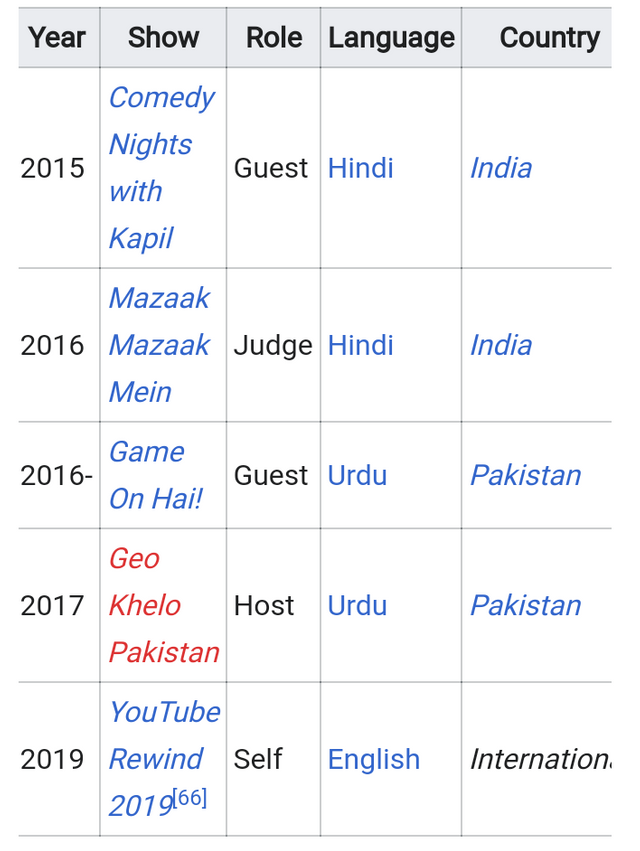
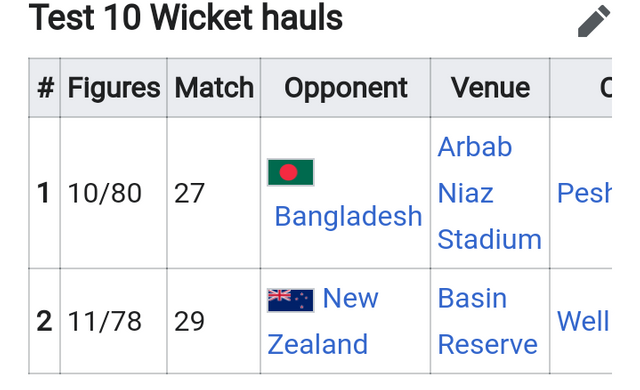
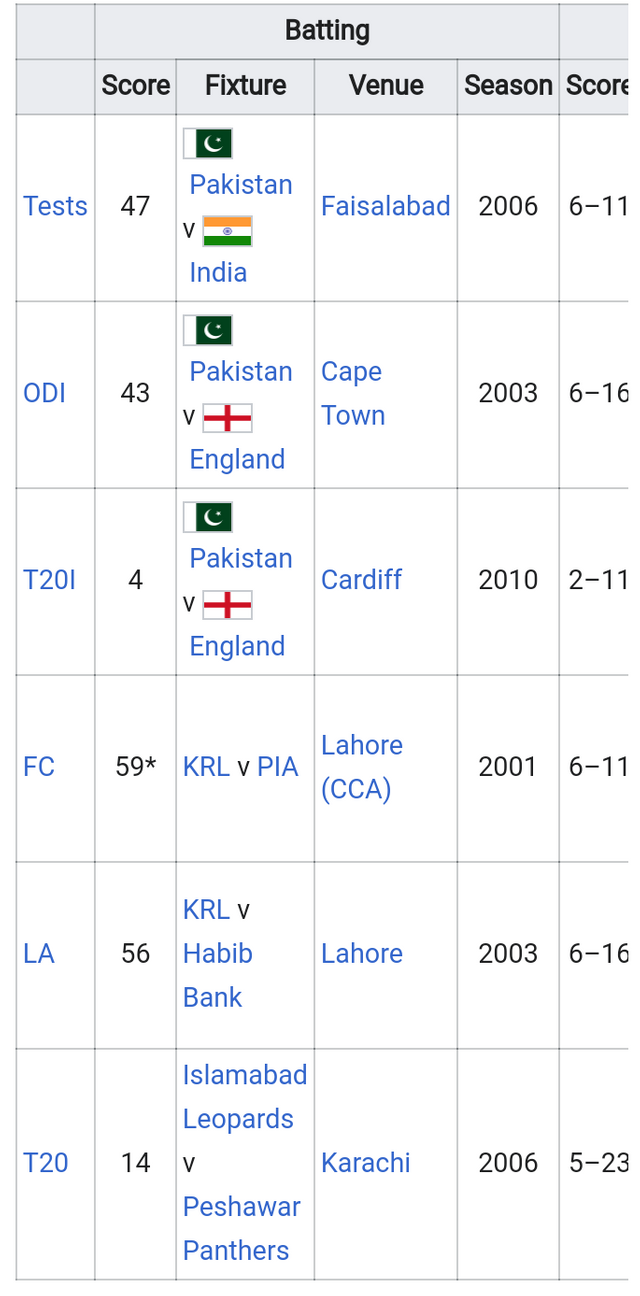
A beautiful photo with Shoaib Akhtar's mother and father۔
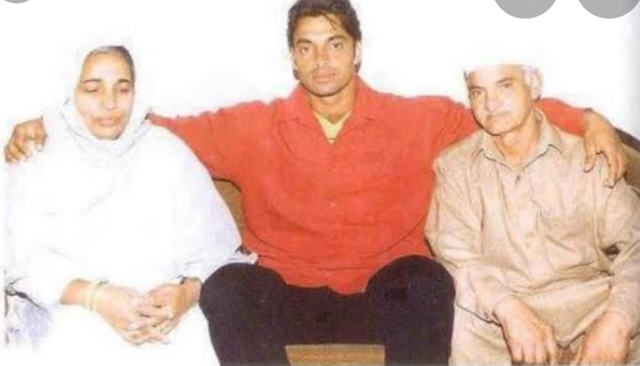
Shoaib Akhtar was also the captain of a small clubAnd one day he went with his brother but one of the boys in his team was less then Shoaib Akhtar said I will play then his brother turned to him and said will you play? He replied, "Yes, I will play." One of his brother's players satisfied his captain, meaning Shoaib's brother. Shoaib Akhtar says that when I bowled, everyone was impressed with my bowling Then my cricket started.